Plants | Term 2 Chapter 3 | 4th Science - Questions with Answers | 4th Science : Term 2 Unit 3 : Plants
Chapter: 4th Science : Term 2 Unit 3 : Plants
Questions with Answers
Plants ( Term 2 Chapter 3 | 4th Science)
Evaluation
I. Choose the correct answer.
1. The tip of the leaf is
a. blade
b. apex
c. midrib
d. veins
Answer: b. apex
2. Which one of the following is a primary producer?
a. Plant
b. Animal
c. Human
d. None of the above
Answer: a. Plant
3. Which flower blooms during winter?
a. Jasmine
b. Tulip
c. December
d. Fire cracker
Answer: c. December
4. Choose the ornamental plant from the list.
a. Parthenium
b. Mango
c. Travellars palm
d. Groundnut
Answer: c. Travellars palm
5. Which plant flower is edible?
a. Cauliflower
b. Potato
c. Mint
d. Cabbage
Answer: a. Cauliflower
II. Fill in the blanks.
1. During photosynthesis food is produced and stored in the leaf.
2. Green plants have chlorophyll pigment.
3. Onion is a stem part of a Plant.
4. The male part of the flower is stamen.
5. An example for edible seed is rice.
III. Answer the following in one or two words.
1. Which is the female part of the plant?
Pistil is the female part of the plant.
2. Write the name of any one of the leaf that is used as a food.
Coriander, Cabbage
3. Which flower bud is used as spices in food?
Clove
4. What are the nutrients present in the seeds?
Carbohydrates and proteins.
5. Write any one of the flower that blooms in summer.
Sunflower.
IV. Answer briefly.
1. Write the parts of the leaf.
• Blade
• Apex
• Midrib
• Veins
• Petiole
• Stomata
2. Define – Photosynthesis.
Photosynthesis is a process by which plants make their food using chlorophyll, water, carbon dioxide in the presence of sunlight.
3. Write the names of the exotic plants.
i) Sago palm (Cycas)
ii) Fern
iii) Crotons
iv) Travellers palm
v) Boat lily
vi) Aloevera
4. Write the names of any two underground stem plant.
Potato, Onion and Ginger
5. Why should we not touch parthenium plant?
The pollen of this plant is allergic in nature. So we should not touch parthenium plant.
V. Answer in detail.
1. Mark any four parts and describe the parts of a leaf.
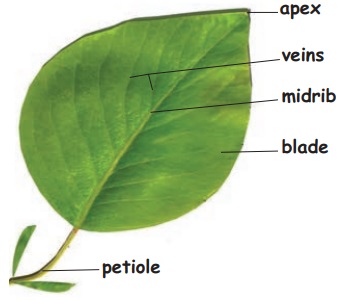
Blade: The broad flat part of the leaf (Lamina)
Apex: The tip of the leaf.
Midrib: The midrib runs along the centre of the leaf.
Veins: Veins are hollow tubes that branch out from the midrib.
Petiole: This part joins the leaf to the main stem.
2. Draw a diagram of a flower and explain the parts of a flower .
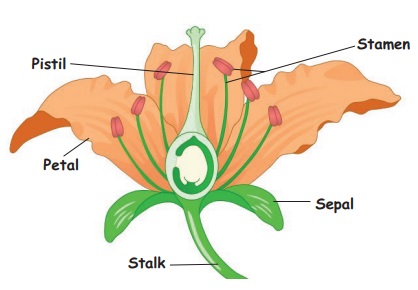
Sepal : Sepals are leaves that protect the flower while it is still a bud. Sepals are usually green in colour.
Petal : Petals are often bright coloured. Their main job is to attract insects such as bees or butterflies, to the flower.
Stamen : Stamen can be seen at the centre of a flower.
They contain pollengrains that help the plants to multiply. It is the male part of a flower.
Pistil : Pistil is also seen at the centre of the flower.
The pistil uses the pollen to help the flower become the fruit. It is the female part of a flower.
VI. Project.
1. Collect the edible parts of different plants used in your home and display them in your class room.
2. Collect some flowers and discuss with your friends about the parts of flower.
Think and answer
• Which part of the leaf collects carbon dioxide?
Answer: Small pores in the leaves (Stomata)
• Which part of the leaf transports water?
Answer: Veins
Think and answer
Why would living things not be able to live without plants?
Answer: Only plants can produce food on their own. They are primary producers. All living things depend on plants for food. So they cannot live without plants.
Try to Answer
Fill in the blanks by rearranging the letters in the bracket.
1. During photosynthesis plants releases oxygen (egxyno).
2. Plant is a primary producer (tanpl).
3. Stomata are seen in the lower (owler) surface of the leaf.
4. Pigment involved in the food synthesis is chlorophyll (phllylochor).
Let us do
Take two potted plants. Keep one in sunlight and other in a fully covered box. Water them regularly. After a week observe the plants.
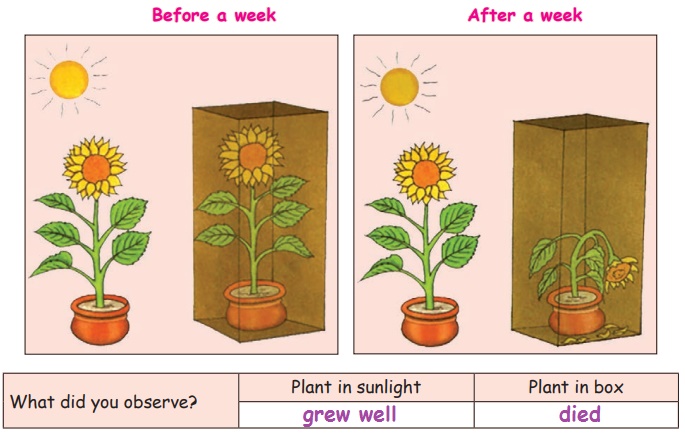
Let us do
List out the flowering and Non-flowering plants in your surrounding.

Flowering plants : Rose, Drumstick, Brinjal
Non-flowering plants : Conifers, Fungi, Ferns
Let us do
List out the places where you see the non-green plants
1. Near dead and decaying plants.
2. Fallen logs.
Try to Answer
Fill in the blanks.
1. Algae is an example for non flowering plant.
2. Plants are classified based on pigment and flower of the plant.
3. Heterotrophs depend on other organism to live and get their food.
4. Autotrophs use carbon dioxide, sunlight and chlorophyll to prepare their own food.
Have you seen flowers? Try to answer the questions given below
a) Which is your favourite flower? Paneer rose
b) What is the colour of the flower? Light pink
c) How does it smell? Paneer smell
Try to Answer
Fill in the blanks.
1. Sepals protect the flower while it is still a bud.
2. Stamen contains pollen grains.
3. Pistil is the female part of a flower.
Let us do
Bring few hibiscus flowers to the classroom. Distribute the flowers to children. Introduce the parts of the flower to them. Then, ask them to observe and feel the different parts of the flower and tell them to record their observation.
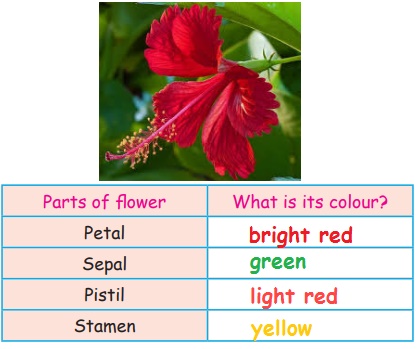
Petal: bright red ; Sepal: green ; Pistil: light red ; Stamen: yellow
More to know
Firecracker flowers bloom in all seasons
Kurinji flower blooms once in 12 years
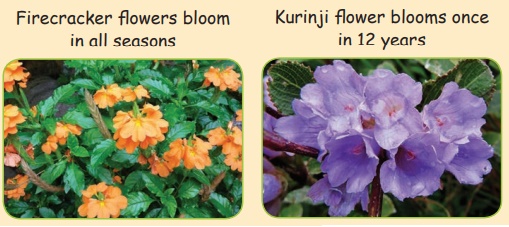
Think and answer: Can you name the four seasons?
Answer: Summer, Spring, Autumn, Winter
Try to Answer
1. Find the odd one.
i. December, Tuberose, Tulip.
ii. Saffron, Dahlia, Rose.
iii. Rose, Boat lily, Crotons.
N.B : i) December and Tuberose bloom in winter.
ii) Saffron and Dahlia bloom in autumn.
iii) Boat lily and Crotons are exotic plants.
Let us do
Collect various ornamental plants and plant in your school garden or at home.
Try to Answer
Fill in the blanks.
1. Cauli flower is used as food.
2. Stem part of the potato plant is used as food.
3. Stem of the onion / ginger stores food in it.
4. Seeds are rich in carbohydrates and proteins.
Let us do
Complete the table to show which parts of the plant we eat.
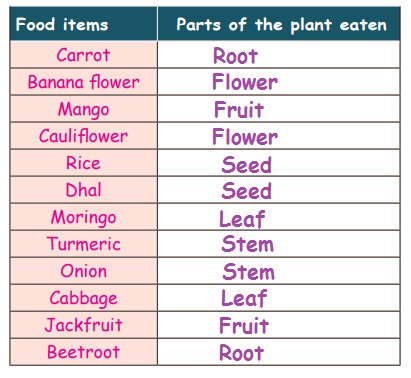
Related Topics